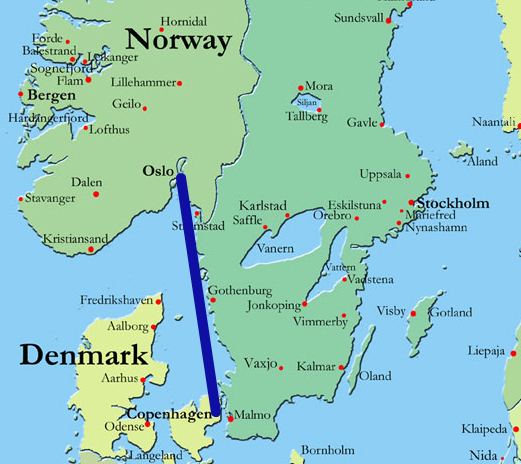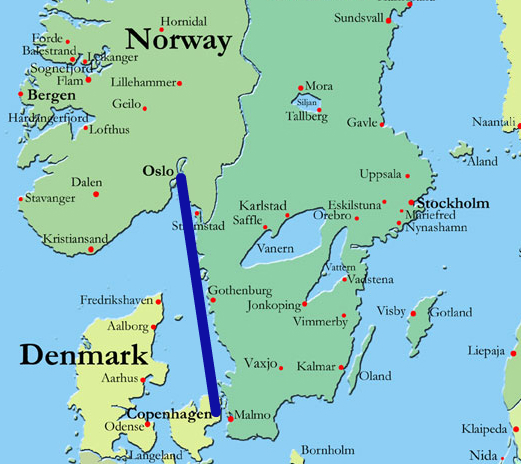Could Barack Obama’s controversial Nobel Prize help bring about an effective global agreement to tackle climate change? Could the American president, by heading straight to Denmark after collecting his prize, actually demonstrate why he was the right pick for the honor within days of delivering his laureate address?
 It’s just a hop, skip and a jump from Oslo to Copenhagen. Will President Obama make the trip in the interest of cashing in his Nobel Prize for a new climate deal?The questions arise because Obama is due to receive the world’s most prestigious award in Oslo on December 10. And just 301 miles away the Copenhagen negotiations, supposed to forge a new international agreement on combatting global warming, will just be gathering steam.
It’s just a hop, skip and a jump from Oslo to Copenhagen. Will President Obama make the trip in the interest of cashing in his Nobel Prize for a new climate deal?The questions arise because Obama is due to receive the world’s most prestigious award in Oslo on December 10. And just 301 miles away the Copenhagen negotiations, supposed to forge a new international agreement on combatting global warming, will just be gathering steam.
Now there are increasing calls for Obama to take his medal with him to the Danish capital – and to urge other world leaders to join him there to break the deadlock in the negotiations.
Gerd Leipold, Greenpeace International’s executive director, says Obama has “an incredible opportunity, and responsibility, to travel to the U.N. Copenhagen climate summit to help avert climate chaos and conflict.”
And Yvo de Boer, the U.N. official in charge of the negotiations, says that he hopes the Peace Prize “encourages [Obama] to come to Copenhagen with an ambitious target.”
As it happened, the Nobel Committee’s recognition of Obama coincided almost exactly with the end of two weeks of disappointing climate negotiations in Bangkok. With just five days of negotiations scheduled before delegates gather in Copenhagen, all the major issues remain unresolved, and in at least one respect rich and poor countries are further apart from ever.
The Bangkok session did manage to clear away some underbrush. Negotiators resolved about half of the 2,500 points of contention in the 200-page negotiating text. But in the words of Kim Carstensen, the head of WWF’s climate team: “After this session the text is shorter, but not much sweeter.”
Progress was made on working out ways of helping poor countries to adapt to the effects on climate change, on transferring cleaner technology and on devising ways of collecting and distributing funds to assist the neediest and most vulnerable nations. There was, in U.N. parlance, “some convergence in language.”
But on one issue, at least, rich and poor nations ended the week further apart. Delegates from developing nations walked out of one meeting after the European Union and the United States made it clear that they wanted to put a new treaty in place of the Kyoto Protocol. Valuing Kyoto for its emphasis on their development, poor nations accused the developed world of wanting to “kill it off.”
Carstensen adds that the text is still full of “political stumbling blocks. On issues that require political breakthroughs, they’ve not made any real progress.”
Targets for emission cuts by developed countries — though creeping upwards, largely as the result of Japan’s goal being made far more ambitious by its new government — still fall far short of what is needed. The prestigious World Resources Institute calculates that they amount to cuts of about 10 to 24 percent below 1990 levels by 2020. That compares with the 25 to 40 percent scientists say will be needed.
Oil-rich Norway provided the one bright spot in Bangkok by promising a 40 percent cut if agreement is reached in Copenhagen. But it was as much a moral gesture as a practical one, having little impact on the industrialized world’s total emissions; as Norway’s lead negotiator acknowledged; “We are a very small country.”
Nor was there any breakthrough on the levels of finance to be provided to the world’s poorest countries to help them tackle and adapt to global warming, despite a proposal by British Prime Minister Gordon Brown this summer for a fund that would rise to some $100 billion a year.
“We came here with hope and confidence, but have to leave with disappointment and deep concern, Su Wei, China’s chief negotiator commented. And Bernarditas Muller of the Philippines added: “We are extremely concerned by the lack of numbers and clear funding commitments by the developed world.”
The G20 summit in September failed to address the issue. Hopes of progress now rest on a meeting of the Major Economies Forum in London this weekend and a meeting of European finance ministers on Monday. Anders Turesson, the chief negotiator for Sweden, which holds the EU Presidency, hopes that these meetings will achieve results, and as a result “by Barcelona we will have a much more elaborate message on the financing side.”
In the end, however, the big issues can only be sorted out by national leaders. President Nicolas Sarkozy of France has called for a new climate summit in November. Brown has undertaken to go to Copenhagen and has asked other leaders to join him. Both will probably be needed.
If this year’s Nobel Peace Prize winner were now to announce that he will to travel the short distance from Oslo to Copenhagen in December, he would virtually ensure a top level attendance that provides the only real hope of success.


